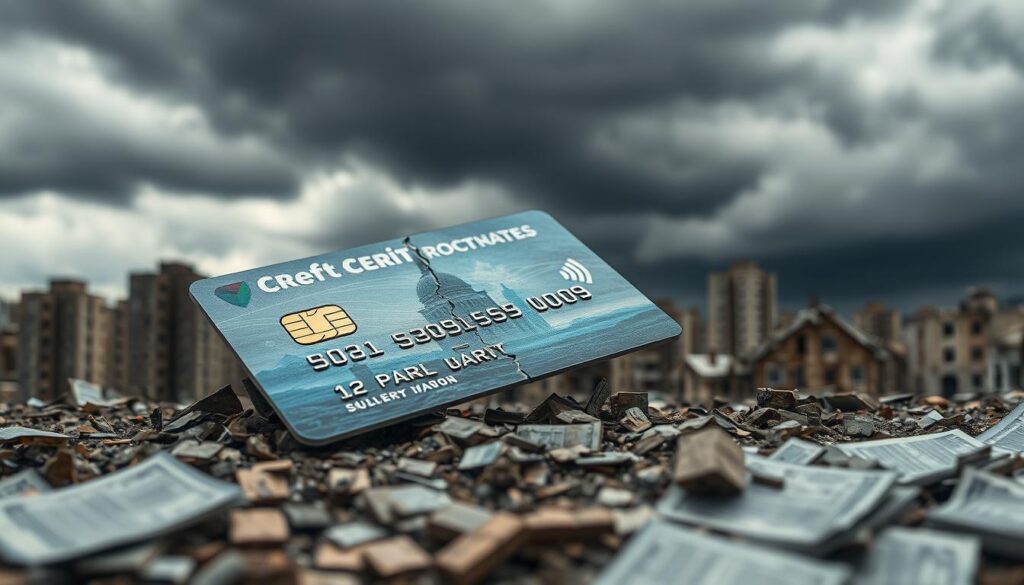Financial struggles can lead some to consider voluntary repossession to settle debts. This choice can seriously affect your credit score for years. Let’s explore how long voluntary repossession impacts your credit and ways to lessen its effects.
Key Takeaways
- Voluntary repossession can remain on your credit report for up to 7 years.
- The duration may be influenced by factors such as the type of asset repossessed and your credit history.
- Strategies like negotiating with the lender and seeking professional credit repair assistance can help minimize the impact.
- Understanding the difference between voluntary and involuntary repossession is crucial.
- Alternatives such as loan modification and debt settlement may be viable options to consider.
Understanding Voluntary Repossession
Financial struggles can make auto loan payments challenging. Voluntary repossession is an option for borrowers in this situation. It means willingly giving up your vehicle to the lender.
Knowing the details of voluntary repossession is important. It can help borrowers make informed decisions during tough times.
What is Voluntary Repossession?
Auto loan voluntary surrender happens when a borrower contacts their lender to return the vehicle. This is different from involuntary repossession, where the lender takes the car without permission.
Voluntary repossession is seen as a more cooperative approach. It shows the borrower’s willingness to work with the lender.
Reasons for Voluntary Repossession
There are several common reasons why individuals may choose to voluntarily surrender their vehicles to the lender, including:
- Inability to make timely loan payments due to financial hardship, such as job loss, medical expenses, or unexpected life events
- Desire to avoid the negative consequences associated with an involuntary repossession, such as additional fees and damage to credit scores
- Acknowledgment that they can no longer afford the vehicle and wish to terminate the loan agreement on their own terms
Knowing the vehicle voluntary repossession consequences is crucial. It helps borrowers choose the best action for their financial situation.
Voluntary repossession can be tough, but sometimes it’s the best choice. It may help avoid worse outcomes in the long run.
“Voluntary repossession can be a difficult decision, but it may be the best option for some borrowers facing financial hardship.”
Impact on Credit Score
Voluntary repossession can significantly affect your credit score. It leaves a lasting mark on your financial history. The impact can be both immediate and long-term.
Voluntary repossession adds negative information to your credit report. This data stays on your report for up to seven years. It can lower your credit score and make obtaining new credit harder.
The impact on your credit score depends on several factors. These include your overall credit history and other negative items. The size of the repossessed loan also plays a role.
- Your overall credit history and the number of other negative items on your report
- The amount of the repossessed loan and the percentage of your available credit it represented
- How quickly you can rebuild your credit after the voluntary repossession
Lenders view voluntary repossession more favorably than involuntary repossession. It shows a proactive approach to financial challenges. However, the credit impact can still be significant.
“A voluntary repossession can leave a lasting impact on your credit score, but with the right strategies, you can work to mitigate the long-term effects.”

Understanding these credit implications helps you minimize damage. You can develop a plan to rebuild your credit over time. This knowledge is valuable for navigating financial challenges.
How Long Does a Voluntary Repossession Stay on Your Credit
Voluntary repossessions can impact your credit report for years. The duration varies based on several factors. Understanding these can help you manage the effects on your credit score.
Factors Affecting the Duration
Lender policies are the main factor in how long a voluntary repossession stays on your credit. Most lenders report it to major credit bureaus. This information can remain for up to 7 years from the repossession date.
State laws may also affect the reporting period. Some states limit it to 5-6 years. This is shorter than the typical 7-year period.
| Factor | Impact on Repossession Duration |
|---|---|
| Lender Reporting Policies | Typically 7 years from the date of repossession |
| State Laws | May limit reporting period to 5-6 years |
The duration of a voluntary repossession may differ from an involuntary one. Involuntary repossessions can stay on your credit report longer. Knowing these differences can help you rebuild your credit score faster.
Mitigating the Effects of Voluntary Repossession
Voluntary repossession can harm your credit score. However, you can take steps to lessen its impact. Being proactive and working with your lender is crucial.
Negotiating with the Lender
Talk to your lender about the voluntary repossession. Open communication can lead to a solution that works for both parties. This is often the first step in credit repair after voluntary repossession.
You might ask for a “goodwill deletion” of the repossession. Another option is to negotiate a partial payment to remove the negative item. You could also request the lender report the account as “paid in full”.
Lenders aren’t required to agree. But a positive approach may help in mitigating voluntary repossession credit damage.
Seeking Professional Credit Repair Assistance
If talking to the lender doesn’t work, consider hiring a credit repair service. These experts can guide you through the process. They have resources to help improve your credit situation.
Credit repair professionals can dispute the repossession on your report. They may negotiate with lenders to update or remove negative items. They can also help create a plan to rebuild your credit.
Working with a specialist can help mitigate the effects of voluntary repossession. It’s a step towards better financial health.

Credit Reporting and Voluntary Repossession
Voluntary repossession affects credit reporting differently than involuntary repossession. Understanding these differences can help you make better financial choices. Let’s explore how these events are recorded on your credit report.
In voluntary repossession, the borrower returns the vehicle to the lender. Involuntary repossession happens when the lender takes the vehicle without consent. This difference impacts how the event appears on your credit report.
| Voluntary Repossession | Involuntary Repossession |
|---|---|
| The borrower’s credit report may show a “voluntary repossession” or “surrender” notation, indicating that the borrower returned the vehicle willingly. | The credit report will likely show a “repossession” notation, which is generally viewed more negatively by lenders. |
| Voluntary repossession may be perceived as a more proactive and responsible approach, as the borrower is taking steps to address the financial situation. | Involuntary repossession is often seen as a more severe and uncontrolled event, which can have a more significant impact on the borrower’s creditworthiness. |
Both voluntary and involuntary repossession can hurt your credit reporting and credit score. The impact’s duration and severity depend on various factors. We’ll explore these factors in the next section.
Rebuilding Credit After Voluntary Repossession
A voluntary repossession can be a major setback for your credit. But don’t worry, you can bounce back with the right approach. The key is taking proactive steps and showing financial responsibility over time.
Start by making timely payments on all your remaining financial obligations. This includes outstanding debts, utility bills, and any new credit accounts. Consistent payments will gradually boost your credit score and impress lenders.
Consider using credit-building tools like secured credit cards or credit-builder loans. These products help people with poor credit establish a positive payment history. They can significantly improve your credit profile over time.
Regularly check your credit reports for accuracy. Dispute any errors or inaccuracies you find. This ensures your report truly reflects your financial history and highlights areas for improvement.
Rebuilding credit takes patience, but it’s worth the effort. By focusing on good financial habits, you can overcome the impact of repossession. You’ll be able to credit repair after voluntary repossession and secure a better financial future.

Consider getting help from a professional credit repair service. These experts offer personalized advice for your situation. They can guide you through credit repair after voluntary repossession and help you reach your financial goals.
Voluntary Repossession vs. Involuntary Repossession
Borrowers may face two scenarios when dealing with debt: voluntary and involuntary repossession. These options can greatly impact a person’s credit score and financial health. Understanding their differences is vital for making informed decisions.
Voluntary repossession happens when a borrower returns a financed asset to the lender. This is often done when monthly payments become unaffordable. It helps avoid the negative effects of involuntary repossession.
Involuntary repossession occurs when the lender takes the asset without the borrower’s consent. This usually happens due to missed or late payments.
| Voluntary Repossession | Involuntary Repossession |
|---|---|
| Borrower initiates the process | Lender initiates the process |
| Less severe impact on credit score | More severe impact on credit score |
| Opportunity to negotiate terms | No negotiation options |
| Potential for a more positive credit history | Negative mark on credit history |
The main difference between voluntary repossession and involuntary repossession is the borrower’s control. Voluntary repossession allows borrowers to manage the situation proactively. This can lead to better outcomes for credit scores and future financial opportunities.
“Voluntary repossession can be a strategic option for borrowers who are struggling to make their payments, as it allows them to take control of the situation and potentially mitigate the long-term impact on their credit.”
Alternatives to Voluntary Repossession
Facing voluntary repossession? Consider loan modification and debt settlement as alternatives. Each option has its own pros and cons.
Loan Modification
Loan modification means renegotiating your existing loan terms with the lender. This could involve extending the loan term or lowering the interest rate. It may also include adjusting your monthly payment amount.
By modifying your loan, you might avoid hurting your credit score. This can be a big advantage over voluntary repossession.
Debt Settlement
Debt settlement is another way to avoid voluntary repossession. Here, you negotiate with the lender to pay less than the full balance.
This approach can provide some relief. However, it may harm your credit score. The settlement could also stay on your credit report for years.
| Alternative | Potential Benefits | Potential Drawbacks |
|---|---|---|
| Loan Modification |
|
|
| Debt Settlement |
|
|
Your choice between these voluntary repossession alternatives depends on your financial situation. Consider your credit history and long-term goals too. Getting expert advice can help you make the best decision.

The Role of Voluntary Repossession in Bankruptcy
Voluntary repossession and bankruptcy are closely connected. People may choose voluntary repossession when struggling with car payments. It can lessen the impact on credit and avoid involuntary repossession’s harsher effects.
The link between these two is complex. Voluntary repossession can offer short-term relief from financial stress. However, it may lead to bankruptcy if underlying money problems persist.
Repossession can severely damage your credit score. This makes it harder to get future financing. For those in bankruptcy, voluntary repossession’s role becomes more complicated.
It might be a strategic move to reduce assets in bankruptcy. This could help keep more personal property. But courts may see it as manipulation of the process.
| Scenario | Potential Outcome |
|---|---|
| Voluntary repossession before bankruptcy | Can help mitigate the impact on credit, but may still lead to bankruptcy if underlying financial issues remain unresolved |
| Voluntary repossession during bankruptcy | Can be viewed as a strategic move to reduce assets, but may also be seen as an attempt to manipulate the bankruptcy process |
The role of voluntary repossession in bankruptcy is complex. It needs careful thought about personal financial situations. Seeking help from a financial advisor or bankruptcy lawyer is crucial.
How Long Does a Voluntary Repossession Stay on Your Credit
A voluntary repossession can impact your credit report significantly. Understanding its duration and effects is crucial for managing your financial future effectively.
Voluntary repossessions usually remain on credit reports for up to 7 years. This aligns with the Fair Credit Reporting Act guidelines across the United States.
However, the exact duration may vary. Factors like lender policies and specific circumstances can influence how long it stays on your record.
| Factors | Impact on Voluntary Repossession Duration |
|---|---|
| Lender Policies | Some lenders may choose to remove the voluntary repossession from your credit report sooner than the standard 7-year period, while others may adhere to the full timeline. |
| Circumstances of Repossession | If the repossession was due to extenuating circumstances, such as a job loss or medical emergency, the lender may be more willing to work with you and potentially remove the negative item from your credit report sooner. |
| Credit Repair Efforts | Proactively working with the lender or a credit repair specialist can sometimes help reduce the duration of the voluntary repossession on your credit report. |
Voluntary repossessions generally have less impact than involuntary ones. Understanding the timeline helps you take steps to minimize long-term effects on your credit score.
The duration of a voluntary repossession on your credit report can vary. Addressing the issue proactively is key to potentially reducing its impact on your creditworthiness.
Dealing with Creditors After Voluntary Repossession
Handling creditors after a voluntary repossession can be tough. But with smart tactics, you can talk to creditors and settle debts. This helps reduce the long-term effects on your finances.
Start by being open with your creditors. Tell them about your situation and how you plan to fix it. Creditors often work with people who are honest and want to solve problems.
- Contact your creditors quickly. Explain why you had to return the item.
- Share a clear plan for paying off the debt. Include possible payment plans or settlement ideas.
- Be ready to compromise. Try to find a solution that works for both sides.
Getting expert help can also be useful. Credit counseling services or debt management programs can guide you. They can help with settling debts and rebuilding your credit.
“To overcome voluntary repossession challenges, be proactive and have a clear plan. Good communication with creditors and exploring options can limit long-term financial effects.”
Remember, voluntary repossession isn’t the end. With hard work and a smart approach, you can rebuild your credit. You can also regain financial stability after this tough experience.
Tips for Avoiding Voluntary Repossession
Voluntary repossession can be scary, but there are ways to avoid it. Smart financial moves and open communication with your lender can help. These steps can prevent repossession and protect your credit score.
Stay in close contact with your lender if you’re struggling with payments. Reach out early. Many lenders offer alternative arrangements like temporary deferments or modified repayment plans.
Manage your budget carefully. Review your spending and find areas to cut back. Prioritize your car payments.
Create a realistic budget and stick to it. This can help prevent voluntary repossession in the long run.
Explore Alternative Options
Before considering voluntary repossession, look into other options. There are several alternatives worth exploring.
- Loan modification: Work with your lender to change loan terms. This could mean extending repayment or reducing interest rates.
- Debt settlement: Negotiate to pay a lump sum less than the full balance owed.
- Selling the vehicle: If possible, sell the car for more than the outstanding balance.
Taking proactive steps can help you avoid voluntary repossession. Explore all available options to protect your credit and financial well-being.
| Strategies | Benefits |
|---|---|
| Communicate with Lender | Increased chances of finding a mutually agreeable solution |
| Manage Budget Carefully | Ensures you have enough to cover car payments |
| Explore Alternatives | Loan modification, debt settlement, or selling the vehicle |
Conclusion
Voluntary repossession can greatly affect your credit score. It can stay on your credit report for seven years. This can make it hard to get loans, credit cards, or even rent a home.
The impact’s duration depends on various factors. These include your payment history and credit-building efforts. Working with your lender and negotiating payment terms can help lessen the effects.
Seeking professional help is also a good idea. Rebuilding credit through responsible practices is crucial. This means making timely payments and keeping credit utilization low.
Financial recovery is possible with the right strategies. You can become stronger and more financially resilient. Stay informed and proactive to overcome the challenges of voluntary repossession.
Take control of your financial future. With the right approach, you can navigate this difficult situation successfully.

